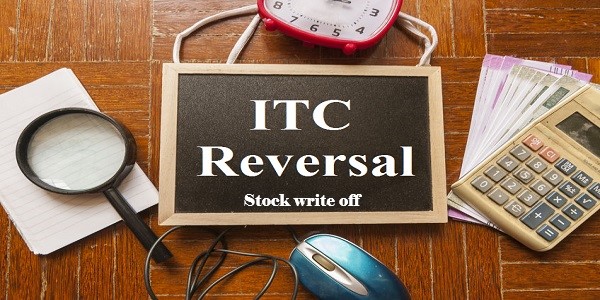1. Introduction:
The GST Audit for the FY 2018-19 must be under final stages with extended due date of filing GSTR-9C being 31st October,2020. During the course of audit one of the compliances to be seen is whether there is any instance of stock destroyed , lost or written off during the year which has been captured in the accounts and if yes, whether the input tax credit thereon has been reversed or not as per requirement of Section 17(5) (h) of the CGST Act,2017.
As per Section 17(5) (h) input tax credit is not available in respect of goods lost, stolen, destroyed or written off. The reason for such a provision is that if goods are lost / written off , such goods will cease to be used for business purposes / taxable supplies which is the basic requirement for input tax credit and thus input tax credit on such goods cannot be availed.
It may be noted here that as per Section 16 of the CGST Act,2017, input tax credit can be availed upon receipt of goods and invoice thereof without it actually have been used for supply. Thus in cases where such goods are subsequently written off, the input tax credit availed thereon should be reversed.
Although there may be an argument that as the credit was availed based upon our intention to use goods for business purposes the credit cannot be taken back based upon a subsequent event of such goods being lost / destroyed / written off. However such a line of thinking is quite aggressive/ litigative and would defeat the purpose of this provision and thus is not advisable.
2. Statutory provisions:
For ready reference relevant extract of Section 17(5) is reproduced below:
(5) Notwithstanding anything contained in sub-section (1) of section 16 and subsection (1) of section 18, input tax credit shall not be available in respect of the following, namely: —
(a)…. to (g)……
(h) goods lost, stolen, destroyed, written off or disposed of by way of gift or free samples; and
(i) ….
A plain reading of clause(h) of Section 17(5) reveals that the reversal requirement arises only on goods on which ITC is claimed and these goods are now ‘destroyed’ or ‘written off’. For instance, (i) a trader purchases goods for trading and claimed ITC on them, or (ii) a manufacturer purchases raw material and claimed ITC on them. Later-on, these goods are destroyed or written off by trader / manufacturer. ITC reversal will be required in this case.
3. Whether ITC of raw material converted, is to be reversed on finished goods being written off:
One issue in implementation of Section 17(5)(h) which arises is when ITC is availed towards a raw material which is actually used in the manufacturing of finished goods and such finished goods are subsequently destroyed or written off by the manufacturer. The question which arises here is whether or not, there is a requirement to reverse ITC in this case.
Reading Section 17(5) closely we may appreciate that ITC is prohibited ” in respect of” the goods stated in the clauses. Thus the answer to above question hinges upon the interpretation of expression ‘in respect of’.
3.1 Meaning of expression ‘in respect of’:
It is important to note that the expression ‘in respect of the following’ as used in Section 17(5) of the CGST Act restricts its scope.
The expression ‘in respect of’ was examined by the Supreme Court in the case of State of Madras v. M/s. Swastik Tobacco Factory [AIR-1966-SC-1000]. In this case, the assessee purchased raw tobacco and converted the same into chewing tobacco. Excise duty was paid on purchase of raw tobacco. As per the applicable provisions, the assessee could claim deduction of excise duty if it was paid ‘in respect of’ the good sold by him (which in this was chewing tobacco). The SC held that Indian tax laws have used the expression ‘in respect of’ as synonymous with the expression ‘on’. If excise duty was paid on raw tobacco it can be attributable only to the raw tobacco and not to chewing tobacco. It was held that no deduction of excise duty is permitted to the assessee.
Thus the as per above Apex Court’s decision the expression ‘in respect of’ will include only the goods and not the finished goods created out of such raw material. Accordingly in case of loss of finished goods, ITC reversal under Section 17(5)(h) in respect of raw material should not be required.
3.2 Ruling of Maharashtra AAR: No ITC reversal required if finished goods destroyed
Further in ruling of Maharashtra AAR in case of M/s. General Manager Ordance Factory Bhandara [2019-VIL-171-AAR] it was held that the question of reversal will arise only if inputs or capital goods are themselves lost, stolen or destroyed. If finished goods are destroyed, lost or stolen, then reversal should not be required. The AAR stated that once ITC is legitimately availed , it cannot be demanded back without specific provision in this regard. there is no provision for demanding the ITC on inputs, capital goods and input services that have already been used for the manufacture of finished goods that are lost or stolen or damaged.
In this case input was used in the manufacturing of finished goods. These finished goods were sent out for testing. Few finished goods got destroyed during the testing process. The authority held that ITC is not required to be reversed under Section 17(5)(h) on finished goods that are destroyed during testing.
3.3 CBIC Clarification says otherwise:
CBIC vide Para No. 3(B)(d) of Circular No. 72/46/2018- GST dated October 26, 2018 has clarified that where the time expired goods, which have been returned by the retailer/wholesaler, are destroyed by the manufacturer, he/she is required to reverse the ITC attributable to the manufacture of such goods, in terms of the provisions of clause (h) of subsection (5) of section 17 of the CGST Act.
The above Circular is contrary to the Maharashtra AAR Ruling. Although it may be noted that the AAR ruling came after the above Circular.
4. ITC reversal is not required on ‘services’
Section 17(5)(h) of the CGST Act, 2017 mandates reversal of ITC on ‘goods’ only. We all know that goods under GST law means input and capital goods.
Thus no ITC reversal is required to be made in respect of services even if it is relatable to goods destroyed or written off. It may be noted here that in case of composite supply , where principal supply is of goods the entire transaction is taxed as goods. For e.g. supply of goods with transportation. In such cases though transportation is supply of service but as principal supply is of goods entire supply will be treated as supply of goods. In such cases if these goods are destroyed the ITC reversal including GST paid on freight will be required.
5. Scope of word ‘written off’
As per Section 17(5)(h) of the CGST Act,2017, ITC is required to be reversed on goods which are inter-alia ‘written off’ by the taxpayer.
It may be noted that similar provision existed in the erstwhile Rule 3(5B) of the CENVAT Credit Rules. However this rule also mandated that if the value of any input is written off fully or partially or where the provision to write off fully or partially is made in the books of account then also the manufacturer / service provider was required to pay an amount equal to the CENVAT credit taken in respect of such input.
Under GST law , ITC is only required to be reversed when goods are fully written off and there are no provision in regard to reversal requirement upon partial write off or upon creation of provision to write off in the books.
6. Concluding remarks:
In light of above deliberations, a registered person should not be required to reverse ITC availed on raw materials used in manufacturing of finished goods which are written off / destroyed/ lost. Although there is a contrary CBIC Circular in this regard. Thus the matter would be litigative. The GST Auditors may take a call in this regard considering above while finalizing their report, if the finished goods are destroyed and ITC towards raw material has not been reversed by the manufacturer.
Further, there is no need to reverse input tax credit where he has made partial write off of goods or on making provision for writing off the goods. Rather reversal of ITC would be required only when the goods are actually written off (excluded) from the books.
***
[rainbow]Don’t miss the next GST Update / Article / Judicial pronouncement[/rainbow]
Subscribe to our newsletter from FREE to stay updated on GST Law
Resolve your GST queries from national level experts on GST free of cost.
CA. Mohammad Salim is an ICAI award winning Chartered Accountant having rich experience of more than 20 years in the field of indirect taxes. He is the Member, Indirect Taxes Committee of PHD Chamber of Commerce and Industry. He is author of four successful books on GST published by Taxmann Publication and is also GST expert on taxmann portal.




